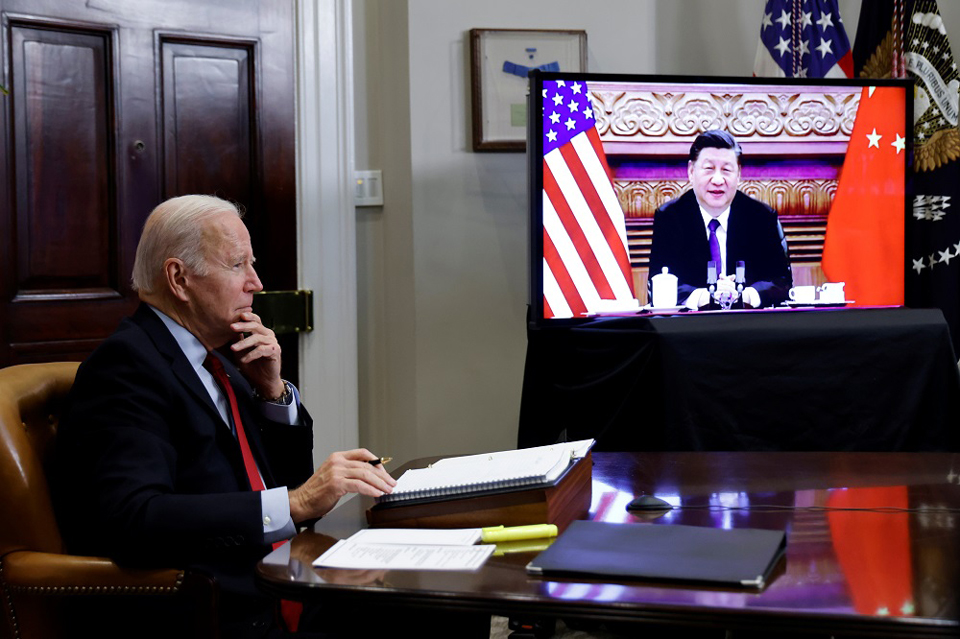
WASHINGTON, March 18, 2022 (BSS/AFP) - US President Joe Biden will warn his
Chinese counterpart Xi Jinping on Friday that he will face "costs" if Beijing
rescues fellow authoritarian ally Russia from intense Western sanctions aimed
at punishing Moscow's invasion of Ukraine.
The two leaders' 9:00 am (1300 GMT) scheduled phone call, their first since
a video summit in November, will be a chance to air differences as the United
States spearheads an unprecedented pressure campaign on Russia, placing China
in a geopolitical bind.
It's "an opportunity for President Biden to assess where President Xi
stands," White House Press Secretary Jen Psaki said.
Trade rows and snarled international supply chains will be discussed,
according to Psaki, but a big focus is expected to be the Western bid to
force Russia from Ukraine, where President Vladimir Putin's invasion is in
its fourth week.
Biden has successfully marshaled a tight Western alliance against Russia,
while giving military support to Ukrainian forces.
But Beijing has refused to condemn Moscow, and Washington fears the Chinese
could switch to full financial and even military support for Russia,
transforming an already explosive transatlantic standoff into a global
dispute.
Not only could Beijing potentially help Russia weather crippling pressure
on its banks and currency, but Western governments would then face the
painful decision of whether or not to impose sanctions against China, likely
prompting turmoil on world markets.
The White House was tight-lipped on whether Biden will threaten China with
sanctions during his call, but some sort of response is on the table.
Biden "will make clear that China will bear responsibility for any actions
it takes to support Russia's aggression and we will not hesitate to impose
costs," Secretary of State Antony Blinken said.
He hoped China would use "whatever leverage they have to compel Moscow to
end this war," the top US diplomat said.
"Instead, it appears that China is moving in the opposite direction,"
Blinken said, adding he was "concerned that they're considering directly
assisting Russia with military assistance."
- China 'balancing priorities' -
The Biden-Xi call comes after US National Security Advisor Jake Sullivan
and Yang Jiechi, the Chinese Communist Party's chief diplomat, held what the
White House called a "substantial" seven hour meeting in Rome this week.
Against a backdrop of already intense tensions over Taiwan and trade
disputes, the ability or failure of Biden and Xi to come to an understanding
on the unfolding mayhem in Europe will reverberate widely.
Xi and Putin symbolically sealed their close partnership when they met at
the February Winter Olympics in Beijing -- just before Putin launched his
onslaught on Ukraine.
Since then, Beijing has stood out by refusing to join international outcry
over the invasion, while taking the Russian line in blaming the United States
and NATO for European tensions. Chinese authorities even refuse to refer to
the invasion as a "war," again in keeping with Kremlin talking points.
But China has also tried to remain somewhat ambiguous, declaring support
for Ukraine's sovereignty.
Under growing pressure to take a side, China will weigh clashing
priorities, said Brookings Institution fellow Ryan Hass, a former advisor on
China to president Barack Obama.
Despite the coziness with Moscow, China -- the number two economy and
world's biggest exporter -- is tightly bound to the US and other Western
economies. It also wants to play a leadership role in the world.
"China's and Russia's interests are not in alignment. Putin is an arsonist
of the international system and President Xi sees himself as an architect for
remaking and improving the international system," Hass said.
"President Xi is trying to balance competing priorities. He really places a
lot of value in China's partnership with Russia but at the same time he does
not want to undermine China's relations in the West."